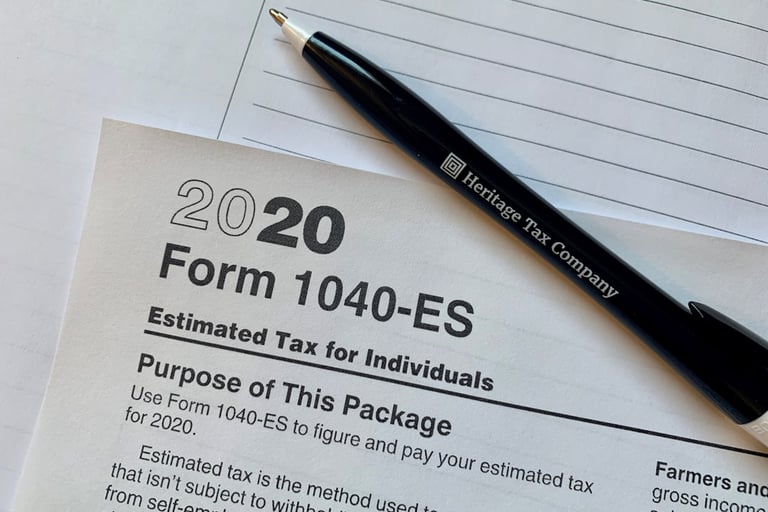The Hidden Cost of Not Having a Tax Plan
Not having a tax plan leads to hidden costs, compliance issues, and missed opportunities. Effective tax planning minimizes liabilities, improves cash flow, and ensures compliance, aiding financial growth.
TAX PLANNINGCOST OF NOT PLANNING TAXESHIDDEN TAX COSTSTAX STRATEGYFINANCIAL PLANNINGTAX IMPLICATIONS
Deus Vult Financial
9/12/20254 min read


Navigating the world of taxes without a clear plan can lead to unforeseen challenges that impact both individuals and small business owners. Without tax planning, one might encounter hidden tax costs that eat away at financial resources, creating unnecessary stress and complications. A well-crafted tax strategy not only helps in avoiding these pitfalls but also optimizes your financial planning and ensures compliance with tax regulations. In this blog post, we will explore the tax implications of not planning taxes and provide actionable insights to help you build a robust tax plan. Join us as we guide you towards a future of informed financial decision-making that aligns with your growth ambitions. For more information on tax planning for small businesses, visit https://preferredcfo.com/insights/tax-planning-for-small-businesses.## Understanding Tax Planning
Tax planning is a crucial aspect of financial management for individuals and businesses alike. It involves strategizing to minimize tax liabilities while staying compliant with tax laws. Let's explore the importance of tax strategy and the benefits of financial planning.
Importance of Tax Strategy
Tax strategy forms the backbone of effective financial management. It allows individuals and businesses to make informed decisions about their finances, investments, and operations.
A well-crafted tax strategy can lead to significant savings and improved cash flow. By understanding tax laws and regulations, you can take advantage of deductions, credits, and incentives that apply to your situation.
Implementing a tax strategy also helps in maintaining compliance with tax authorities, reducing the risk of audits and penalties. As noted by the IRS, proper tax planning is essential for small businesses and self-employed individuals to meet their tax obligations.
Benefits of Financial Planning
Financial planning goes hand in hand with tax planning, offering a comprehensive approach to managing your money and achieving your financial goals.
One of the primary benefits of financial planning is the ability to create a roadmap for your financial future. This includes setting short-term and long-term goals, budgeting, and making informed investment decisions.
Financial planning also helps in risk management by identifying potential financial pitfalls and developing strategies to mitigate them. According to a report by the FDIC, effective financial planning can significantly improve the success rate of small businesses.
Hidden Costs of Ignoring Tax Planning
Neglecting tax planning can lead to unexpected financial burdens and missed opportunities. This section will delve into the common tax implications and financial risks associated with inadequate tax planning.
Common Tax Implications
Failing to plan for taxes can result in various negative consequences that impact your financial health.
One of the most significant implications is overpaying taxes due to missed deductions or credits. Without a proper tax strategy, you might overlook legitimate ways to reduce your tax liability, effectively leaving money on the table.
Another common issue is cash flow problems caused by unexpected tax bills. This can be particularly challenging for small businesses, as highlighted in a report by the Senate Committee on Small Business and Entrepreneurship.
Inadequate tax planning can also lead to compliance issues, potentially resulting in penalties and interest charges from tax authorities.
Financial Risks and Oversights
Beyond direct tax implications, poor tax planning can expose individuals and businesses to various financial risks.
One such risk is making uninformed financial decisions. Without considering the tax consequences of your actions, you might make choices that seem beneficial in the short term but lead to higher tax liabilities in the future.
Another oversight is failing to take advantage of tax-efficient investment strategies. This can result in lower after-tax returns on your investments, impacting your long-term financial goals.
Lastly, inadequate tax planning can lead to missed opportunities for business growth and expansion. Tax incentives and credits designed to encourage certain business activities might go unused, limiting potential growth avenues.
Steps to Develop a Tax Plan
Creating an effective tax plan requires careful consideration and often professional expertise. This section outlines essential strategies and the importance of seeking professional guidance.
Essential Tax Planning Strategies
Implementing effective tax planning strategies can significantly improve your financial position and reduce tax liabilities.
One crucial strategy is to maintain accurate and up-to-date financial records. This allows for better tracking of income, expenses, and potential deductions. As Merrill Lynch advises, good record-keeping is essential for small business owners to maximize tax benefits.
Another key strategy is to time income and expenses strategically. This might involve deferring income to a future tax year or accelerating deductions into the current year, depending on your tax situation.
Lastly, consider structuring your business or investments in a tax-efficient manner. This could involve choosing the right business entity or utilizing tax-advantaged accounts for investments.
Seeking Professional Guidance
Not having a tax plan is more expensive than most people realize. It costs you money today, steals from your future, creates stress, and limits your financial freedom.
The good news? It’s never too late to start. A tax strategy can help you keep more of what you earn and use it to create the future you want.
✅ CTA: Ready to stop overpaying Uncle Sam? Contact Deus Vult Financial today to build a personalized tax strategy that protects your wealth.




Follow us
Expert coverage solutions, personal finance guidance and business strategies tailored to your needs.
Contact Us
Send us a message
info@deusvult.finance
(877) 241-2439
© 2024. Deus Vult Financial, All rights reserved.
Deus Vult Financial
712 1st Terrace 220 D
Lansing, KS 66043


